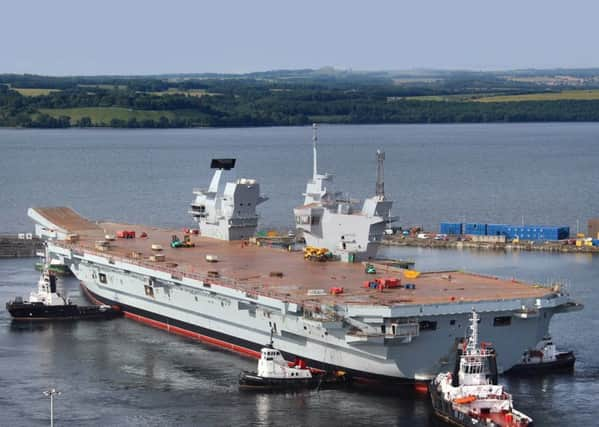Britain to upgrade one of the Royal Navy's new aircraft carriers to back amphibious assaults


Philip Dunne, defence procurement minister, revealed the move following a question from Fareham MP, Suella Fernandes.
It comes after the government announced it would be scrapping the 22,000-tonne helicopter carrier, HMS Ocean, which provides aerial support for the marines.
Advertisement
Hide AdAdvertisement
Hide AdMr Dunne promised one of the two new Queen Elizabeth-class carriers – both of which will be based in Portsmouth – will be upgraded to maintain the nation’s ‘amphibious capability’.
The pledge comes following Ms Fernandes’s week spent on exercise with the navy’s elite troops in the freezing fjords of Norway.
Speaking to MPs in the Commons, Mr Dunne said: ‘The SDSR (Strategic Defence and Security Review) is committed to maintaining amphibious capability.
‘We will be making modifications to one of the two Queen Elizabeth carriers to ensure that that persists for the life of that platform.’
Advertisement
Hide AdAdvertisement
Hide AdThe QEC aircraft carriers will operate as part of a Maritime Task Group.
The carrier will be capable of deploying up to 40 helicopters to support the marines on operation, from Apache attack helicopters, to Merlins, Chinooks and Wildcats.
During Ms Fernandes’s trip to Norway, she spent time with the men from 539 Assault Squadron during the force’s annual cold-weather training.
Situated in the Arctic Circle and with temperatures plummeting to -30C, it is one of the most challenging environments to train in.
But for the Royal Marines, it is a home away from home.
Advertisement
Hide AdAdvertisement
Hide AdTroops learn to fight and survive in the harsh conditions as well as refining key skills that can be used on the front lines.
As part of the Fareham MP’s visit, she was able to witness some of the exercises first-hand, from aggressive amphibious assaults to stealthy reconnaissance missions.
And Ms Fernandes was given the chance to meet marines and inspect some of the equipment they use.
She said the role the marines played was ‘vital’ and that it was a ‘privilege’ to join them.
‘It was bitterly cold, and camping out in the Arctic is certainly not something I would recommend as a relaxing break, but I learned a huge amount from it,’ she added.